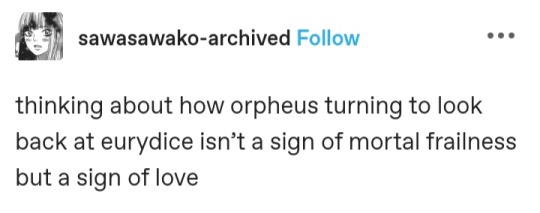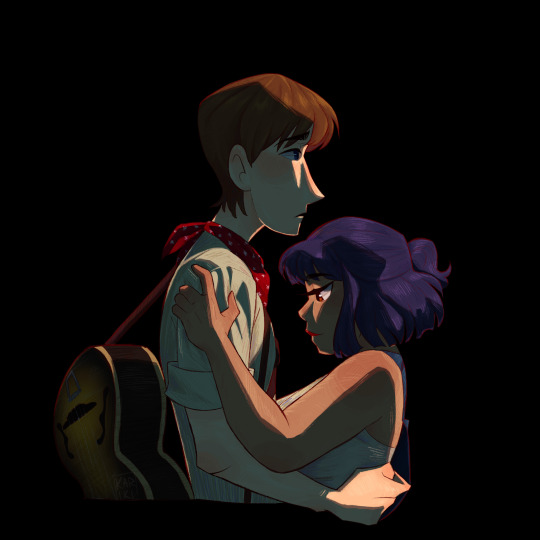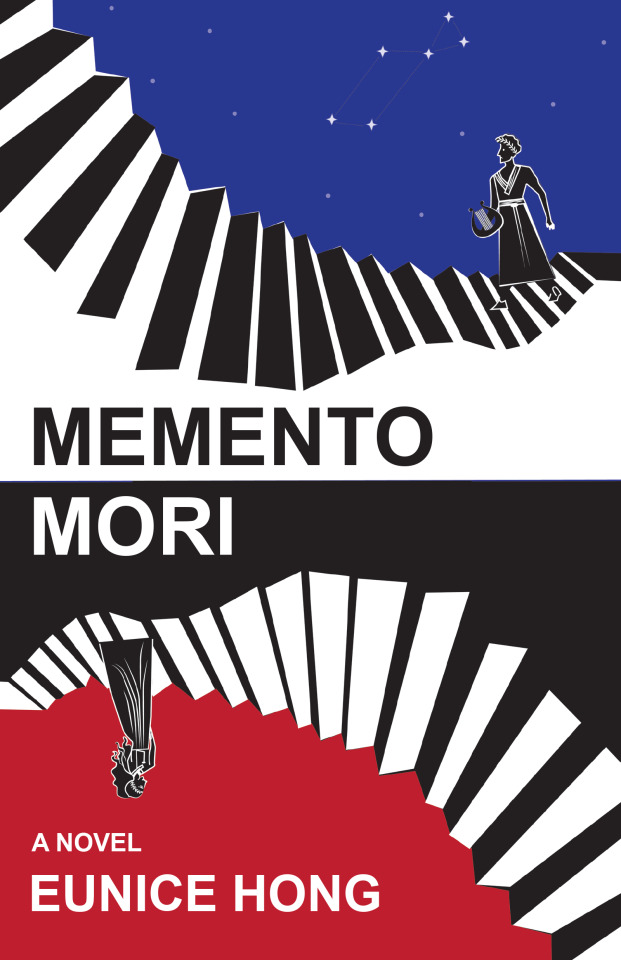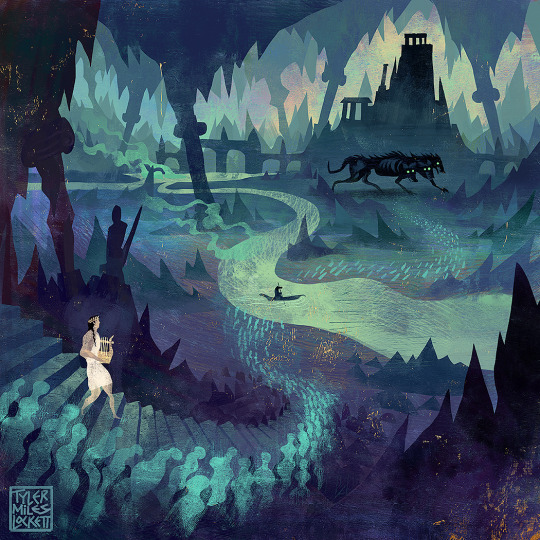#orpheus and eurydice retelling
Text

Rating: 3.5/5
Book Blurb: Lakelore meets “Orpheus and Eurydice” when two Miami teens travel to the underworld to retrieve their girlfriend’s soul.
Andres Santos of São Paulo was all swinging fists and firecracker fury, a foot soldier in the war between his parents, until he drowned in the Tietê River… and made a bargain with Death for a new life. A year later, his parents have relocated the family to Miami, but their promises of a fresh start quickly dissolve in the summer heat.
Instead of fists, Andres now uses music to escape his parents’ battles. While wandering Miami Beach, he meets two girls: photographer Renee, a blaze of fire, and dancer Liora, a ray of sunshine. The three become a polyamorous triad, happy, despite how no one understands their relationship. But when a car accident leaves Liora in a coma, Andres and Renee are shattered.
Then Renee proposes a radical solution: She and Andres must go into the underworld to retrieve their girlfriend’s spirit and reunite it with her body—before it’s too late. Their search takes them to the City of the dead, where painters bleed color, songs grow flowers, and regretful souls will do anything to forget their lives on earth. But finding Liora’s spirit is only the first step in returning to the living world. Because when Andres drowned, he left a part of himself in the underworld—a part he’s in no hurry to meet again. But it is eager to be reunited with him...
In verse as vibrant as the Miami skyline, critically acclaimed author R.M. Romero has crafted a masterpiece of magical realism and an openhearted ode to the nature of healing.
Review:
A polyamorous retelling of Orpheus and Eurydice told in verse! The story follows two Miami teens as they travel to the Underworld to retrieve their girlfriend's soul. Andres Santos is someone who swings his fist and lets his anger take hold, someone who is stuck in the middle of his parent's fights, and someone who drowned in the river until he made a bargain with Death for a new life. A year after the incident his family has moved to Miami... and thats where he meets two girls: photographer Renee and dancer Liora. The three become a polyamorous triad, happy in their love despite the fact that no one understands their relationship. However when Liora gets into an accident and ends up in a coma, Andres and Renee are broken... that is until Renee proposes that they both go to the underworld to retrieve their girlfriend's soil and reunite it with her body. Yet as they travel into the underworld, their relationship will be tested and Andres will have to face his own demon... one he left behind on the day he drowned. This was definitely a really unique retelling on the classic story and while I didn't particularly enjoy the in verse style of the novel and felt that some parts were a bit muddled, the overall story itself is one I would recommend. I feel like if you enjoy in verse novels, this is definitely one you should add to your TBR! It's a gorgeous retelling and it definitely creates a unique story while staying true to the spirit of the classic.
*Thanks Netgalley and Holiday House / Peachtree / Pixel+Ink | Peachtree Teen for sending me an arc in exchange for an honest review*
4 notes
·
View notes
Text







#orpheus eurydice imagery anyone??!? ANYONE?!!?!?#*gnaws at tabletops* im fine I'm finee im fine I'm#wilmon is a retelling. the snake is august. the snake bite is wille's lie.#the underworld is being driven into hiding. and this time orpheus succeeds.#OR SO I HOPE#young royals#young royals season 3#wilmon#hozier#web weaving
365 notes
·
View notes
Text
'i wouldnt look back at eurydice im build different' keep telling youself that, would you hold on to tam lin as they transformed in to a bear as they mauled you? a lion as they scratched? an ember as they licked your arms with hot flames?
#ive been relistening to Tam Lin by The Forgetmenauts its a very good retelling#tam lin#orpheus and eurydice#most people have nothing on my girl bonny janet
80 notes
·
View notes
Text

It’s a sad song, it’s a sad tale…
#hadestown#broadway#musicals#hadestown fanart#fan art#my artwork#art#digital art#orpheus#eurydice#artist#my art#greek myth retellings#greek myth art#greek myths#musical theatre
303 notes
·
View notes
Text
I wonder what it would be like to have an Orpheus/Eurydice story where Eurydice starts out as this innocent and naive young bride who has zero real world experience and it's never occurred to her to get some until she dies.
As soon as she hits the underworld, she's exposed to all sorts of people from all walks of life, and her character is enriched by it and she becomes this robust, fully formed character in her own right, rather than as the wife of a famous musician.
Meanwhile Orpheus remains kind of flat and one-note in his sensitive heroic artist persona, even as he's helped through the underworld after Eurydice by kind souls who came to like her-- only to be treated as a sort of requisite stepping stone by him. Of *course* they're supposed to help him, he's a *hero* for coming down here after the love of his life.
When he strikes the deal with Hades, he starts leading the way out, with Eurydice trailing behind. Part of her wants to go home, yes, but she doesn't want to go back to how she was. She's shed her old skin, and she can't climb back into it.
She's asking Orpheus questions, pushing about how he truly feels about her, how he truly sees and treats the world around him, and this is where his entitlement and subtle misogyny rears its ugly head.
He gets more and more terse with her, and he finally snaps and whirls to shout at her, only for her to blink out of sight as she's banished back to the underworld.
For him, the outcome is the same as the original myth-- he's mourned as this tremendous artist with a sensitive soul who did his best to save his wife but in his desperation to see her again, loses her forever.
But the AUDIENCE knows the truth. That Eurydice's tale is a cautionary one about a man's anger, how quick he might turn if his perception of you is challenged in any way. How even the most sensitive and tender of souls can be and are shaped by the society around them, to the deteriment of themselves and those around them. How entitlement and ego can sour if they're not appropriately fed.
How a single moment of anger can undo an epic's worth of work, and end a story before it can even start.
#eurydice#orpheus#myth retelling#i would like to read this#just dont have the time to write it myself
94 notes
·
View notes
Text


ALT TEXT: Elena’s thumb moves back and forth across the Traveler’s cheekbones. Back and forth. Back and forth. “Can I tell you what I thought about you the very first time I saw you?” She doesn’t wait for a response. “That you don’t hide your heart. That told me you were kind, that you love first and think last.” She smells Elena’s strawberry flavored lip balm, can taste the fragrance across her lips. Dizzy. “That you hold everyone you come across in your heart, and you won’t ever let them go. No matter how badly it hurts you.” She’s quiet for another moment. “I admire that. It’s a quality I wish I had."
#BEGGING EVERYONE TO PLEASE NOT FORGET ABOUT MY GAY COWGIRLS#blindly navigating my way back into social media like a bird opening its eyes for the first time#ive decided my eventual pitch of this book will be a sapphic orpheus and eurydice retelling but also silent hill and kentucky route zero#also i cannot BELIEVE the 4.99 a month to go ad free!! on TUMBLR.COM!!!#for a serious update: i'm on draft 3 and am getting ready to send it out to more eyes to read!!#Jinx has been helping me a TON with this#<3 <3 <3#tell me if there's a way home#tell me if there's a way home update
29 notes
·
View notes
Text
Okay yes, I get how "If I was Orpheus, I wouldn't look back" is most often missing the point.
But what about "What if Orpheus didn't look back?" What about his unwavering faith that Eurydice was there made her doubt and her steps falter? What about the way she felt when even at the sound of her stumbling his head didn't even twitch in her direction?
What if Orpheus was still in anguish the whole time, but would sooner cast himself into Tartarus then let the feebleness of his mortal heart be responsible for ripping Eurydice from him again? What if he knew he loved her too much not to look back, so he took briars and gouged his eyes down to his neck and left them there, focusing on the bleeding pain to keep the urge to turn at bay. What if he bled out on the last step into the light, and Eurydice came back into life alone?
What if it's always a tragedy, but the loss is different every time?
And what if it isn't? What if this time the love is not too strong to resist the doubt, but instead strong enough to bear it? What if it's a tale of the triumph of human spirit? What if all they have is their faith in each other, and it hardens their resolve like all the diamonds in Hades' domain?
What if this time, love is enough?
I wonder how many people are missing the point when responding to those imagining themselves Orpheus triumphant. Maybe right now the myth they need is one where they save their lover from even death itself, because they were brave enough to let hope guide them. Maybe they need a story where faith that the light of their heart will come through is enough. Maybe they just need to believe that they couldn't lose their partner forever over their own fallibility, that they couldn't destroy their most precious person with their own all-too-human imperfections.
Take a moment and think: The story of Orpheus always ends the same, but does it have to? Myths change in the retelling.
If you were Orpheus - Orpheus, but also still you - would you look back? Are you bound by his fate and doomed by the narrative? Can you break out of its chains and use them to challenge the very Fates until the story is rewritten? Does it still end in tragedy? Can you look back and still win?
Why?
Myths are about why.
To truly understand a mythic figure, you must understand - myths get shaped and changed and are as fluid as ephemeral language itself because of the why.
#orpheus#eurydice#classicism#greek mythology#greek myths#greek myth retellings#analysis#Myths Are Alive
31 notes
·
View notes
Text

From the play "Eurydice" by Sarah Ruhl.
#art#love#book quotes#booklover#classic literature#classic#Orpheus#eurydice#playwright#sarah ruhl#retelling
50 notes
·
View notes
Text

Today's daily male is Orpheus from Hadestown!
for @basil-the-bulbasaur
#daily male#Orpheus#orpheus and eurydice#Hadestown#hadestown broadway#hadestown tour#greek myth retellings#chibueze ihuoma#men#masculinity#mod howl#hadestown is my favorite musical I love it so much#I'm using chibueze ihuoma for the picture cause he's both one of my favorite Orpheuses and the only one I've seen live#he's incredibly talented
53 notes
·
View notes
Text
Listening to The Sandman Act 3, and meeting Orpheus’ new friend Aristaeus, and wondering where I’ve heard that name before, then remembering when I’ve heard that name before and saying “Oh NO” out loud
#the sandman#sandman#Orpheus#song of Orpheus#Eurydice#aristaeus#greek mythology#tagamemnon#greek myth#greek myth retellings#neil gaiman
33 notes
·
View notes
Text
Was there any proof that Eurydice was actually behind Orpheus?
Did the story say that she was still behind him, walking, praying that he trusted enough that she was there.
Or did hades lie? Did he say that she would be there, that she would be right behind him every step of the way. And she wasn’t. She was right where she always was in the underworld, not knowing what was going on.
Maybe hades lied and she saw anyway. Seeing her lover trust the man that had trapped her here say that she had an escape but she didn’t. Silently begging Orpheus to look behind him, come help her, come get her out of this place.
Maybe hades didn’t lie but she wasn’t behind him anyway. Maybe Eurydice didn’t want to go back. She knew that you can’t come back from death and have everything back to normal. Everyone she loved had mourned her, accepted she was gone, and moved on. What would they think if Eurydice suddenly showed back up after they had all suffered her loss for so long? They would hate that they had gone through that and why wouldn’t they see their suffering in her and hate her for it. What if Eurydice knew that and thought not to put herself and others through that. What if Eurydice stood there at the beginning of the path watching Orpheus, so trusting, trying so hard to go back to normal, wanting to tell him that it was too late. Normal is gone.
What if Eurydice wasn’t there. Would that even make it sadder? What’s worse, failing because you had a chance and messed it up? Knowing that it could have been and it’s your fault it can’t anymore. But maybe… at least it could have been. Or is it worse if it would never have been. You were doomed from the start and yet you still wasted your time trying. Maybe you knew, and didn’t care. Or you really thought you had a chance. And you still do, and you still think it’s your fault something didn’t work out. Sure, the hope is gone but… so is the shame of being the reason that this failed.
#orpheus#eurydice#greek mythology#greek myth retellings#first tumblr post#long post#i don’t know#I don’t know what I’m doing#please if anyone interacts be nice#i’m sorry#I’m also sorry if there’s any inaccuracies#sprinkle a little bit of philosophy in there for the last part maybe
27 notes
·
View notes
Text
Cover Reveal + Preorder!

Don't look back.
Did Eurydice want to return from the underworld? Did anybody ask?
Weaving together Greek mythology, neuroscience, and memories inherited from her Korean grandparents, the narrator grapples with death by telling stories to her younger brother that ask what life means for him, for her, and for their family.
Recasting the myths of Eurydice, Orpheus, Persephone, and Hades through the lens of a Korean American family, Eunice Hong's debut novel explores the grief and love of a woman coming to terms with trauma, memory, and the inescapability of death.
Release Date: August 13, 2024
Preorder at Bookshop, Target, and Barnes & Noble, among other places!
#memento mori#cover reveal#preorder#eurydice#orpheus#greek mythology#korean-american#grief#mourning#novel#literature#greek myth#underworld#writing#writeblr#books#bookblr#myth retelling#sort of
35 notes
·
View notes
Text
Orpheus Ex Machina - A type of Deus Ex Machina where it’s specifically a song that solves everything (or almost)
#an idea I just had#not a bad thing#orpheus#eurydice#hades#persephone#steven universe#hadestown musical#broadway#hadestown broadway#hadestown#literature#meme#memes#greek mythology#greek gods#greek myth#ancient greek#greek posts#greek myth retellings#books#tv shows#movies#tumblr#funny#thoughts#ideas#fantasy#laugh tag#laugh rule
23 notes
·
View notes
Text
Please, I just want a lyrical, beautiful, poetic Greek mythology retelling novel on the myth of Orpheus and Eurydice. If this already exists someone please tell me because I am not aware of it and I need it. My life will not be complete until it has been written, and I have it in my hand while I sit cross-legged on my bed, annotating its tear-stained pages. Is that so much to ask for?
#dark academia#romantic academia#book blog#classic academia#dakota warren#dark academic aesthetic#fawn novelle#art#poetry#spilled ink#greek myth retellings#greek mythology#greek myth book#bookblr#orpheus#eurydice#orpheus and eurydice#someone please tell me#i need this with every fiber of my being#if you find it in 5 years#reblog this post#so i can finally be at peace#thank you ♡
17 notes
·
View notes
Text
Loosing my mind thinking about how even though there’s no version of the story in which Orpheus doesn’t look back.
Also thinking of the fact that there’s no version of the story where Orpheus doesn’t at least try to get Eurydice back.
#orpheus#eurydice#greek mythology#greek myth retellings#hadestown#there’s no version where katniss doesn’t volunteer#there’s no version where prim lives
22 notes
·
View notes
Text

"Chthonic Descent" by me, (image #4 in my Orpheus and Eurydice series)
part 4: The Roman poet Virgil, in his poem “Georgics”, gives a lush description of Orpheus descent into Hades;
“…entering the grove gloomy with black horror, he approached the Manes (dead spirits), and the tremendous king, and the hearts that know not how to relent at human prayers. But the thin shades being stirred up by his song from the lowest mansions of Erebus moved along, and the Ghosts deprived of light… mothers and husbands, and the departed bodies of magnanimous heroes, boys and unmarried girls, and youths laid on funeral pyres before the faces of their parents, whom the black mud and squalid reeds of Cocytus, and the lake hateful with stagnant water encloses around, and styx nine times interfused restrains.” (-translation from the Latin by John Martyn.)
The word Chthonic in my title is an adjective describing something belonging to the underworld. This would be an apt time to discuss the structure and details of the ancient Greek underworld; the realm of Hades. Our oldest literary source in Homer’s “Odyssey” (700 B.C.) portrays the realm as dark, gloomy, and frightening. A place where all souls go, and lacking skin and bone; have no physical form. The shades (spirits) wander mindless, and without memory.
In Virgil’s “Aeneid” (25 B.C.) we get a much more detailed account of the geography. Our hero Aeneas pays the boatman Charon to ferry him across the river styx, and after passing the three headed guard-hound Cerberus, they eventually come to a crossroad leading to two important realms; Tartarus (an invincible fortress guarded by one of the Furies, where sinners are punished) and Elysium (a sunny paradise where pure souls pursue leisure activities).
As always, thanks for looking and reading. If you want to see more of my artwork, please click my linktree: https://linktr.ee/tylermileslockett
#tagamemnon#mythology tag#greekmyths#greek myth retellings#pjo#percy jackson fanart#percy jackon and the olympians#percyjackson#classical literature#dark academia#hero myth#orpheus#eurydice#apollo#hermes#hades#persephone#tartarus#elysium#underworld
465 notes
·
View notes